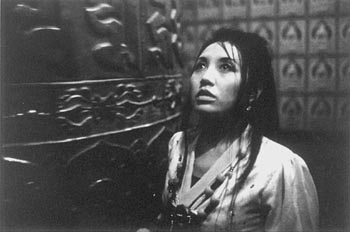![[Metroactive Movies]](/movies/gifs/movies468.gif)
[ Movies Index | Metro | Metroactive Central | Archives ]
Spinning Wheels
 Prayer Session: Dadon at her prayer wheel in 'Windhorse.' The Tibetan propaganda film 'Windhorse' is half tourist brochure, half political pamphlet MORE THAN a dozen members of the cast of Windhorse are listed as "name withheld." That's no surprise, considering that Chinese-occupied Tibet has no tolerance for dissent. Windhorse, the first feature film by Paul Wagner, a documentary maker (Out of Ireland, The Stone Carvers, Miles of Smiles), is based on the real-life experience of Wagner's niece Julia Elliot, who was held for hours by the Chinese authorities after filming a demonstration in Lhasa. Thupten Tsering, Elliot's Tibetan boyfriend, Wagner and Elliot collaborated on a screenplay that, sadly, dramatizes the events in contemporary Tibet in the terms of the most uncomplicated propaganda films. The title comes from the attractive handkerchief-sized printed Tibetan prayer flags, much like the cloth flags which fly over of hip gardens from Berkeley to Santa Cruz (the belief is that every time the wind hits them, a prayer is as good as recited). The family of a Tibetan man, one of the million Tibetans killed since the Chinese occupation in 1950, copes with the occupation. Their grandmother, the widow of the patriot, refuses to have any dealings with the Chinese. Granddaughter Dolkar (a performer named only Dadon) is a nightclub singer with an ambitious Chinese boyfriend named Duan-Ping (Richard Chang). Duan-Ping has connections with the Chinese entertainment industry; his acquaintances there believe that Dolkar can be made a symbol of Tibetan/Chinese harmony. Thus Dolkar learns to sing songs with lyrics like "The Golden Sun is rising over our mountains/Chairman Mao is that golden sun." Dolkar's sellout adds bitterness to the heart of Dolkar's brother, a hard-drinking layabout named Dorjee (Jampa Kolsang). Two other characters emerge: Amy (Taije Silverman), a crop-haired, fresh-faced Yank tourist with a digital camera, and Dolkar and Dorjee's cousin, the Buddhist nun Pema (played by an actor who is one of those listed as "Name Withheld"), who makes a spontaneous protest against the occupation and is imprisoned and severely beaten. Wagner shot many of the cityscapes in Lhasa, Tibet's capital, on Sony DVW 700 WF digital tape. The ever-rising quality of this cheap, portable medium is cause for excitement. It was brave of Wagner to make this movie behind the lines, as it were. The exhibition of the smuggled film has been a richly deserved embarrassment for the Chinese government, which has compounded that embarrassment by leaning on several film festivals to withdraw Windhorse. Despite its honorable quality both as contraband and as technological innovation, Windhorse is too simple to be counted as drama. The westernized eye of Wagner lingers too long on every gilded Buddha, every candle and every spinning prayer wheel. The radicalization of sister Dolkar and brother Dorjee is too speedy to be believed, and the all-wise granny is two-dimensional. Half tourist brochure, half political tract, Windhorse never finds the command of art necessary to match its excellent intentions.
Windhorse (Unrated; 97 min.), directed by Paul Wagner, written by Julia Elliot and Thupten Tsering, photographed by Steve Schecter and starring Richard Chang and Dadon. [ San Jose | Metroactive Central | Archives ]
|
From the March 11-17, 1999 issue of Metro.
Copyright © Metro Publishing Inc. Maintained by Boulevards New Media.